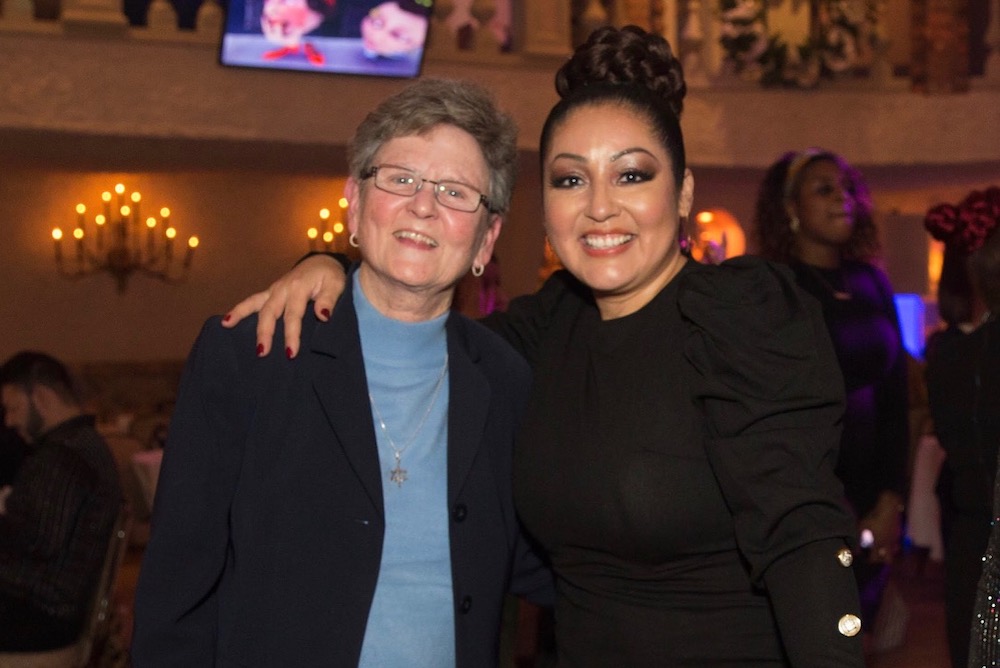
St. Joseph Sr. Tesa Fitzgerald, left, with Johanna Flores at an Hour Children social event in New York City. (Courtesy of Johanna Flores)
Like many other mothers who have served time, Johanna Flores will celebrate Mother's Day on Sunday with family, hope for the future and deep appreciation for work she loves.
"It's a day to demonstrate to people I care about, who have made a difference in my life, how special they are," said Flores, 40, who served four years in prison 20 years ago on a drug-smuggling charge.
One of those people is St. Joseph Sr. Tesa Fitzgerald, a "mother" and mentor to thousands of women who have experienced prison and have rebuilt lives thanks to Hour Children, a self-described "provider of services to incarcerated and formerly incarcerated women in New York State."
"She believed in me before I believed in myself," Flores said of Fitzgerald, noting the important role mentors have in the lives of women who have been incarcerated.
The roots of Hour Children date back almost 40 years when Fitzgerald, a native of the Far Rockaway section of the New York City borough of Queens, joined with four other members of the Sisters of St. Joseph of Brentwood, New York, to found a home in the borough for children with incarcerated mothers.
The sisters became, in effect, foster parents for the children, even accompanying the children on prison visits.
Advertisement
Fitzgerald soon realized the ministry had to expand. The mothers needed support when they were released so they could make the transition to productive lives.
"Hour Children grew out of the needs of the women when they came out of prison," Fitzgerald said.
The significance of the program's name stems from the various hours children experience: the hour a mother is arrested, the hour the children are allowed to visit their mothers in prison, and the hour a mother is released, Fitzgerald said.
In 2022, Hour Children will mark 30 years since it was incorporated in 1992. Fitzgerald, 73, is still at the helm — lovingly and exuberantly — and not resting on laurels that include being named the 2014 laureate of the Opus Prize, 2013 White House Champion of Change and a CNN Hero in 2012.
She said about 6,000 people "have called us home over the decades, and countless have utilized our services and support in various ways, inside and out."
Interviewed late last month when she and her staff were settling in to the realities of working amid the COVID-19 pandemic, Fitzgerald expressed deep concern about the pandemic but betrayed no worry about the ministry's prospects or about the determination of the mothers she works with.
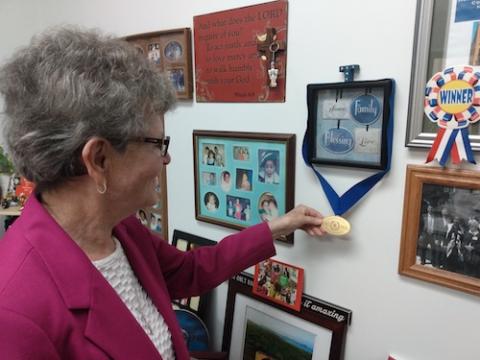
St. Joseph Sr. Tesa Fitzgerald touches the medal she received as the 2014 laureate of the Opus Prize in her office at Hour Children in Long Island City, Queens, New York. (GSR photo/Chris Herlinger)
"It's not been an easy time," she said. "Our child care program has stopped for the moment, but other programs have moved online. And our social workers are working harder than ever."
Fitzgerald said she sees the organization's work as a needed balm.
"The prison system is broken, and we need to be honest about it," Fitzgerald said, though she is quick to add that there are "many, many people" who work within the prison system who are humane and try to affirm the dignity of those incarcerated.
Upholding dignity is vital, said Krisanne Vaillancourt Murphy, who heads the Catholic Mobilizing Network, a national Catholic organization working to end the death penalty and to promote restorative justice.
"As Catholics, we are called to honor the God-given dignity of all human persons, regardless of the harm one has suffered or caused," she told GSR. "Yet too often, the U.S. criminal legal system fails to uphold these values and instead vilifies and dehumanizes those who have committed acts of harm."
In affirming the values of "God-given dignity" in the prison context, Hour Children is one of many: In California, Get on the Bus, founded by Los Angeles-based St. Joseph of Carondelet Srs. Suzanne Jabro and Suzanne Steffen in 1999, coordinates yearly visits for children and their caregivers with the children's parents who are in prison.
Prison visits are just one piece of Hour Children's programs. The ministry runs three thrift shops in Queens, transitional housing for former prisoners in six communal homes and three apartment houses, a food pantry and an infant nursery. It also provides mentoring for prisoners' children and employment training for women who have left prison.
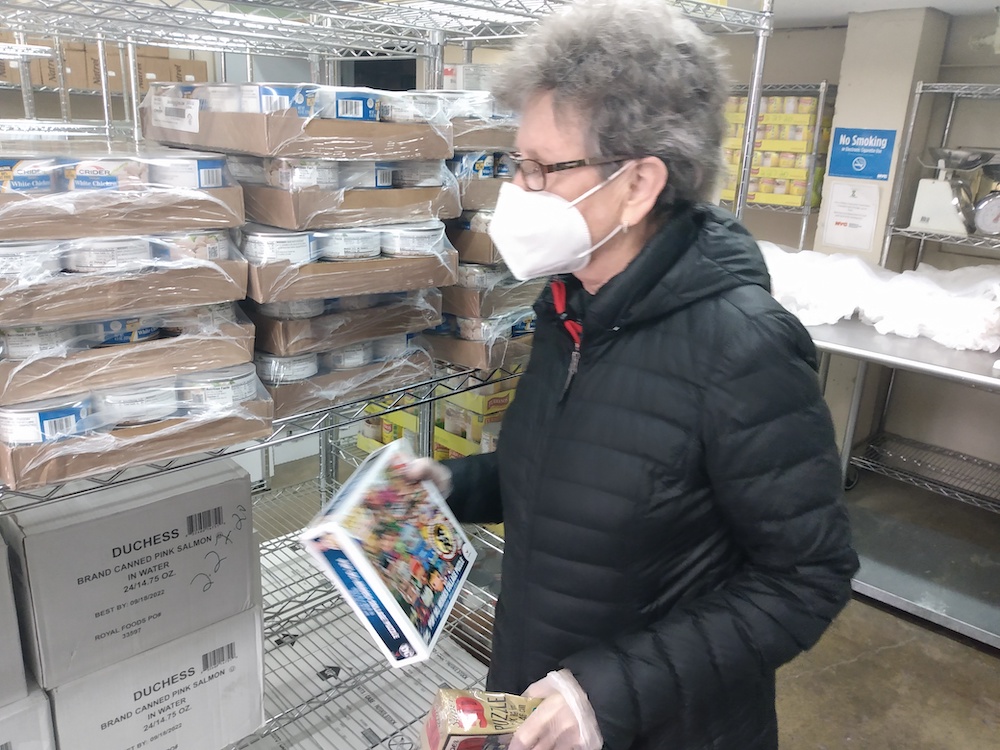
Sr. Tesa Fitzgerald at Hour Children's Long Island City food pantry, one of the organization's several programs (GSR photo/Chris Herlinger)
Most women 'step up to the challenge'
The walls of Fitzgerald's office are filled with numerous framed photographs of mothers and children she has known. Each tells "a story of wonderful, wonderful families who have shared their lives with us," Fitzgerald said.
A few photographs evoke memories tinged with sadness. Fitzgerald looked across her desk and pointed to a photograph of one young woman named Stephanie, who was doing well after serving time for a drug charge. She won acclaim as a public speaker sharing her experiences in prison and seemed to be "extremely committed to rebuilding her life," Fitzgerald said.
But after two years, Stephanie moved back in with her mother, got involved with drugs once again and died of a drug overdose. The influence of her mother and a man contributed to Stephanie's troubles, Fitzgerald said, adding that Stephanie did not grow up in a loving family.
"A lot of the women can't relate to a loving, nurturing mother, and they all want that," she said, noting that Stephanie herself was a loving mother.
Many of the women Hour Children helps, including Flores, eventually flourish as mothers themselves.
"I look at them and say, 'Wow,' " Fitzgerald said.
At the end of the day, "there are many stories of success," Fitzgerald said brightly, stroking a cat named Richie that is something of the office mascot.
The Hour Children programs are intended to focus on that success, and most women "step up to the challenges" of life after prison.
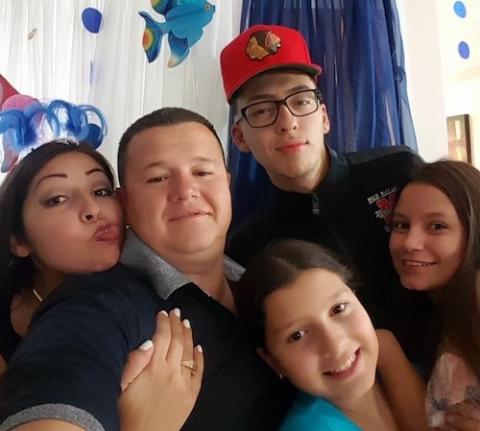
Johanna Flores, left, with her husband, Diego Cortes; son, Edwin Garcia; and daughters Carolina Cortes (in blue) and Laura Cortes (Courtesy of Johanna Flores)
But the challenges are considerable. Many women have to repair broken or severed family relationships, especially with their children — though some women don't see their kids again. That's largely because "the children get lost" to the foster care system, Fitzgerald said. And sometimes, older children decide they "have to move on with their lives."
"Rebuilding those family relationships has to be built on truth" — truth about the crime the woman went to prison for and how it harmed family relationships, Fitzgerald said.
The women also face the challenges of trying to get a job, training for employment, preparing for job interviews.
"And men," Fitzgerald said with mock exasperation. "Some women think they can't live without a man."
The goal: a career, not a job
A good part of the focus of the organization's work is nuts and bolts. While some women use computers in prison, some don't. And even those with some computer background face a steep learning curve, with new computer programs and applications to learn. Email, and email etiquette, are foreign to many.
Some have been incarcerated so long — like one woman who spent 26 years in prison — that they don't know how to operate a cellphone, Fitzgerald said.
In the quest to move forward, it is common for women to "want a job immediately," said Flores, employment coordinator for Hour Children. "It's a challenge at first."
But she urges them to take a deep breath, to be cautious and methodical as well as ambitious, saying they have to "adjust into society."
"What many of them don't realize is that they really need training first," she said. "Time, training and education."
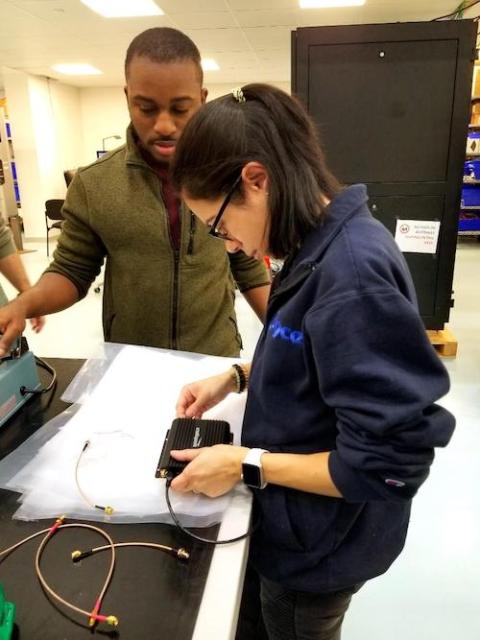
Michelle Yannantuono, an Hour Children alumna, and fellow Boyce Technologies assembly-line worker Moises Robinson (Courtesy of Boyce Technologies)
Proper training, she said, will ground them so they can aim for a career, not just a job.
The Hour Working Women Program is an employment and job-training program specifically designed to support those who have left prison with a limited education and little or no job experience, Flores said. This means they don't have the marketable skills needed to re-enter the community and resume responsibility for their children, often as single parents.
The program's goal, Flores said, "is to provide the resources an individual needs to obtain and retain a livable wage job so that they can achieve self-sufficiency and provide for their family."
Among the program's components, she added, are training, educational opportunities such as preparation for the high school equivalency exam, internships, and job placement support.
Usually, the program is a year long, depending on individual needs, Flores said
"In a matter of three months, we are able to see the transformation of the participants," she said.
Since 2008, 550 women have participated in the program.
"By the time the women finish, they get it," Flores said, and many establish careers quickly.
But how the current pandemic will change that is hard to assess, said Flores, who herself became sick with COVID-19 in March and had to be hospitalized briefly.
The program has had to assess what changes to make. Despite technological challenges and a rapid two-week turnaround, online training is up and running.
Still, Flores said, "we're going to have to take it to a new level now," as the pandemic is likely to further stress the need for online job skills among applicants.
But Flores has confidence in the Hour Children participants.
"Once this is over, I am convinced they will be ready," she said.
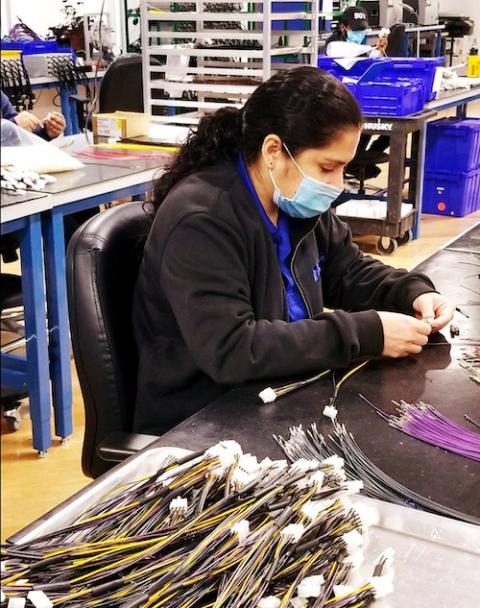
Gina Monzon, an Hour Children alumna, works on the assembly line of Boyce Technologies in Long Island City, Queens, New York. (Courtesy of Boyce Technologies)
So is Charles Boyce, president of Boyce Technologies, a Long Island City company that manufactures a variety of technological equipment for the New York City subway system and has hired a number of Hour Children alumni.
In an interview with GSR, Boyce described Fitzgerald as "an inspiration" who "has the ability to see what's inside people."
"We get great job candidates here," he said of those Fitzgerald and her staff recommend. In the last three years, the company has hired about 10 women from Hour Children to work the company's assembly line, jobs that require running sophisticated machinery.
"Every one of them has been spectacular," he said. "We're always anxious to have more."
Such optimism mirrors Flores'. A U.S. citizen who grew up in Tijuana, Mexico, she was arrested in 2000 at John F. Kennedy International Airport on a drug-smuggling charge. That landed her a four- to 12-year prison sentence, with time in correctional facilities in both New York City and upstate New York.
"I made a mistake, not thinking of the consequences," she said. "I did the time, but I didn't allow the time to do me."
Flores spent her four years in prison honing her English-language, business and cooking skills and got work release at a facility in New York City. There, she met Fitzgerald, who encouraged her to get her associate of arts degree; she is still aiming for a bachelor's degree in human services.
The thought of higher education was once far from her mind.
"Me? College?" Flores recalled of her initial reaction to Fitzgerald's suggestion. "She gave me an idea I'd never had before. Sister Tesa wants me and the other women to be successful."
One motivation she and other former prisoners embrace is to never to return to prison.
"I would absolutely do anything not to go back," she said.
A steady job and meaningful work contribute to that success. So does the love of her three children, Edwin Garcia, Carolina Cortes and Laura Cortes, and her husband, Diego Cortes. Not to mention the love shown to her by Fitzgerald, who Flores said "is like a mother to all of us. She's a blessing to a lot of people."
A blessing and a good dancer. At one Hour Children social event honoring the St. Joseph sister, Flores saw Fitzgerald hit the dance floor — salsa dancing, no less.
"I didn't know how to dance. I didn't grow up with it," Flores said. "When I saw her on the dance floor, I said to myself, 'I can't believe a nun knows how to dance and I don't.' "
Flores now dances.
"Salsa, merengue and bachata," she said, laughing. "They call me 'JFlo.' "
Fitzgerald delights in stories like that, and they affirm the values that are central to Hour Children's mission: Every person has the capacity for change, and all human beings are worthy of dignity and respect.
Women in prison know all about that, Fitzgerald said.
"We're talking about good people who made a bad choice," she said. "Some of the best people I know have owned their mistakes."
"There's a quality to them which is impressive and humbling."
[Chris Herlinger is GSR international correspondent. His email address is cherlinger@ncronline.org.]







